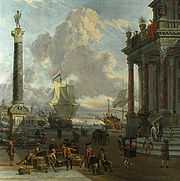Economic union
| Part of a series on |
| World trade |
|---|
 |
|
Economic integration |
An economic union is a type of trade bloc which is composed of a common market with a customs union. The participant countries have both common policies on product regulation, freedom of movement of goods, services and the factors of production (capital and labour) and a common external trade policy. When an economic union involves unifying currency it becomes a economic and monetary union.
Purposes for establishing an economic union normally include increasing economic efficiency and establishing closer political and cultural ties between the member countries.
Economic union is established through trade pact.
List of economic unions
.png)
Every economic and monetary union has also an economic union; these are not listed below.
- European Union[1][2]
- CARICOM Single Market and Economy of the Caribbean Community[3]
- Eurasian Economic Union
- Monaco - European Union[4]
Additionally the autonomous and dependent territories, such as some of the EU member state special territories, are sometimes treated as separate customs territory from their mainland state or have varying arrangements of formal or de facto customs union, common market and currency union (or combinations thereof) with the mainland and in regards to third countries through the trade pacts signed by the mainland state.[5]
Proposed
- 2015 East African Community (EAC)
- 2015 Southern African Development Community (SADC)
- 2015 Southern Common Market (Mercosur)[6]
- 2020 Arab Customs Union and Common Market[7]
- 2023 African Economic Community (AEC)
- Union of South American Nations (USAN)
- Andean Community (CAN)[8]
- Economic Community of Central African States (ECCAS)
- Economic Community of West African States (ECOWAS)
- Gulf Cooperation Council[9]
- Closer Economic Relations of Australia and New Zealand
- Central American Common Market (CACM)
Subnational
- New West Partnership - western provinces in Canada
See also
References
- ↑ Economic union between all EU member states, but those of them inside the Eurozone are also part of an economic and monetary union.
- ↑ Established by the Treaty of Rome in force from 1958-1-1. WT/REG138/2
- ↑ Established by the Treaty of Chaguaramas in force from 1973-8-1 WT/REG92/R/B/1
- ↑ Partial participation in the common market through the Franco-Monegasque Treaty, and with the formal agreement to use the Euro Monaco is in a de facto economic and monetary union with the EU.
- ↑ EU Overseas countries and some other territories participate partially in the EU single market per part four of the Treaty Establishing the European Community; Some EU Outermost regions and other territories use the Euro of the currency union, others are part of the customs union; some participate in both unions and some in neither.
Territories of the United States, Australian External Territories and Realm of New Zealand territories share the currency and mostly also the market of their respective mainland state, but are generally not part of its customs territory. - ↑ WT/REG238/M/1
- ↑ Leaders set to approve Arab customs union
- ↑ Twelfth Andean Presidential Council Act of Lima
- ↑ Gulf states form common market
External links
| |||||||||||||||||||||||||||||||||||||